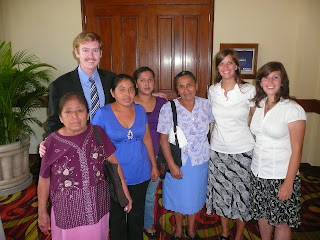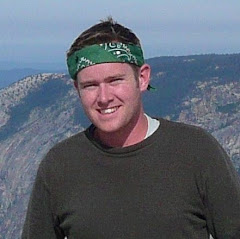Specifically, my site is the rural community of San Nicolas (yes, like Santa Claus), about 12 km from the small town of San Fernando in the department of Nueva Segovia. For those with a map handy, if you follow the road from Ocotal to Jalapa, my site is about halfway between the two cities, about an hour or so from each. (And in case you were wondering, it gives me immense amounts of joy to confirm that people from Jalapa are indeed referred to as Jalapeños.)
A few days after receiving our site assignments, we headed up to Esteli where we met our community counterparts and our individual partners in INTA, the Nicaraguan agricultural
ministry. Maria Esther, who will be my host mother for the first 6 weeks at my permanent site, is the wife of Norberto, one of the leaders of the community of about 400 individuals. Elmer, my INTA counterpart, is a trained agricultural technician, and I will be working with him over the next years to bring improved agricultural techniques and equipment to rural communities in the San Fernando area. In addition to these two resources, I will also have numerous opportunities to work with any of the dozens of other organizations working in northern Nicaragua, as well as design and implement my own projects.
From Esteli, all of the soon-to-be volunteers split up for the first time to visit their new sites with their community counterparts. Maria Esther and I hopped on a crowded, standing-room only bus headed north towards Nueva Segovia. As the bus ate up the familiar miles along the winding
Ocotal-Jalapa road, I looked out at the sharp pointed Ocote pines and the seemingly endless cornfields below them and grew quietly elated that these mountains, fields, and little adobe hamlets will one day be as familiar to me as the Washington Monument and Sleeping Giant already are.
My site visit lasted 4 days, and during that short time, I was introduced to many of the people I will be living and working with for the next 24 months. After a quick bike ride around the fields
and dirt roads with my new host brother Erick, I was handed off to Don Maximo, a quiet cowboy who rocks the most amazing mustache/cowboy hat combo I've ever seen. Together, we must've visited a dozen houses over the course of 4 hours, stopping to platicar (chitchat) in each and downing cup after cup of strong Nica coffee. The people were incredibly kind, hospitable, and open to me living in their community for the next 24 months. For my part, I tried in halting, caffeine-spiked Spanish to tell them a little about myself, learn about their families and
farms, and explain the types of projects I will be looking to develop with them.
After returning from our site visits, we had a final week of Spanish instruction in our training towns as well as our agricultural product fair with our Los Rincones youth group. Though our cinnamon-spiced mango jelly didn't place at all (a hot sauce ended up taking the big prize), it was a great experience to work with the youth in our town, laughing with them, having impromptu dance parties (reggaeton anyone?), playing soccer, and seeing how worthwhile (and profitable) it can be to make products with resources that exist right in their backyards.
Finally, the time came to say goodbye to my host family in Los Rincones. After 11 weeks, metric tons of gallo pinto, gallons of fresh-squeezed juice, countless language mixups, and the serenity that comes from being able to sleep through rooster calls at 4 in the morning, I felt ready to tackle Nicaragua at large, and throw myself into a new community alone. I also realized how much I
was going to miss my host family. No matter where I go, who I meet, and how much my Spanish improves over the next two years, Doña Teresa, Don Bacilio, Elida, Jasmina, Eufemia, Rey, David, and the two Luises will always be my first family in Nicaragua. I've been fortunate enough to have had two host family experiences in two vastly different countries over the past couple years. And the one thing that never ceases to amaze me is how similar people are worldwide, and how in just a few quick months a group of complete strangers, speaking a completely different language, can become friends for life. And I, who came only 3 months ago, slack-jawed with culture shock, can't wait to visit again, to catch up with the latest telenovela gossip from my host sisters and chase lizards across the yard with David and Luisito.
Our last week as Peace Corps Trainees before swearing in as Volunteers came around, and
after packing up and leaving our host families we traveled to Managua, where we were put up in a hotel for the week, and given our final training sessions (all the fine print, like not going on vacation for a month to Europe without telling anyone or running weapons across the border for Colombian drug lords). The big day came around, Friday, August 30th, and as the guys p
ut on their ties (and groomed their matching mustaches) and the girls got all dressed up, it was hard to believe that a few weeks earlier we'd been castrating pigs and vaccinating chickens, and that in just a few days from now we'd be spread all about the rural hinterlands of this country. After several words by Peace Corps staff and some Nicaraguan government representatives, Robert Callaghan, the U.S. Ambassador to Nicaragua, asked us to raise our right hands and swore us in as the newest Volunteers of Peace Corps Nicaragua. To close out the ceremony, a new volunteer from both the Small Business and Agriculture groups were asked to say a few words. I had the honor of being chosen by my fellow aggies to address the Ambassador, the Peace Corps Nica staff, all the new volunteers, and the host families that had come to see us off (including mine!) in a brief recap of training and some words of inspiration for the next two years. Oh, and did I mention it was in Spanish? Public speaking in English is hard enough, but it wen
t well and I think it was well-received. And at least I know my Spanish was fairly comprehensible, because I was asked to give an interview for Nicaraguan television afterwards!
With swearing-in finally over, we spent the weekend in Managua enjoying our last time together for a while, staying out late and eating well before we have to get up with the roosters. I'm headed off to my site tomorrow, and I'll be sure to post an update on my first few weeks in site soon. Wish me luck!

























